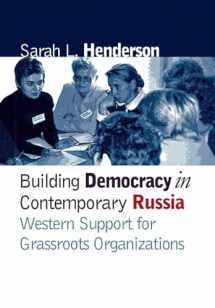
Building Democracy in Contemporary Russia: Western Support for Grassroots Organizations
Book details
Summary
Description
Can foreign donors help build new democracies? In the 1990s, public and private organizations such as USAID and the Soros Foundation poured huge amounts of money and expertise into Russia to help build the dream of a vibrant democratic society. Sarah L. Henderson argues that despite the altruistic intentions of foreign assistance agencies and domestic activists, foreign aid designed to spur civic growth has had unintended consequences.
Drawing on extensive field work, survey research, and work experience for several funding agencies in Moscow in the late 1990s, Henderson focuses on donor efforts to support the emerging community of nongovernmental organizations and, in particular, on efforts to build a functioning women's movement in Russia.
Her intimate knowledge of Russia's growing NGO community informs a worrisome finding: foreign aid has made a tremendous difference, but not in altogether expected or positive ways. New Russian civic groups serve either the needs of an indigenous clientele or the demands of the foreign aid bureaucracy―but rarely both. Henderson's research and experience show that while aid has kept a fledgling civic community alive, it is a civic community that is disconnected from its own domestic audience. The book suggests that large flows of foreign aid have in some ways damaged the long-term prospects for democratization in Russia.


We would LOVE it if you could help us and other readers by reviewing the book
Book review



